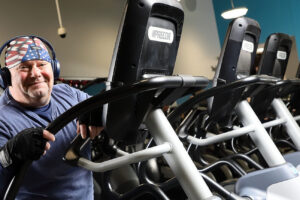African-American male basketball players are most at risk for experiencing sudden cardiac death. This March Madness, let’s box out heart disease by raising awareness about the signs and symptoms.
It’s estimated that one in every 50,000 sudden cardiac deaths occurs in young athletes. During sudden cardiac arrest, blood flow can’t get to the athlete’s vital organs, causing him or her to feel dizzy. If not treated within a few minutes, death is likely.
What Causes Heart Conditions in Children?
Children can develop heart issues for three reasons:
- Being born with congenital heart disease, which occurs in about 1 percent of births
- Developing an illness that damages the heart, such as pericarditis, and certain viral and inflammatory diseases
- Having a genetic mutation for heart disease from a parent that is “activated” later in life
Of the genetic conditions that can cause sudden cardiac death, hypertrophic cardiomyopathy is the most common. This disease causes the heart muscle to become abnormally thick, which makes it more difficult for the heart to pump blood. However, hypertrophic cardiomyopathy often goes undiagnosed because most people with the disease have few, if any, symptoms. Other genetic conditions that can lead to sudden cardiac arrest include a coronary artery anomaly, which can cause chest pain and shortness of breath, mimicking the symptoms of asthma, and long QT syndrome, which affects the heart’s electrical system and can cause heart rhythm abnormalities, leading to sudden death. Both of these conditions may be detected during a thorough cardiac evaluation.
Who is at Risk?
While sudden cardiac arrest is the leading cause of death in young athletes, it is rare. It happens most often during intense training or competition, when high school and college athletes are most motivated to push themselves the extra mile to win. In these situations, adrenaline, heart rate, and blood pressure are all raised, and the heart is contracting intensely to perform.
Risk factors include:
- Having a family history of cardiac symptoms/problems
- Having a family history of sudden, unexpected death
- Playing basketball, soccer, or football
- Being male
- Being African-American
In fact, male Division 1 basketball players are 10 times more like to experience sudden cardiac death than other young athletes.
What Are the Symptoms of Heart Disease?
It’s important that student athletes—and their parents, coaches, teachers, friends, and siblings—recognize the signs of heart disease. In a presumably healthy child, symptoms can include:
- A decline in athletic performance
- Chest pain
- Shortness of breath
- Heart palpitations
- Dizziness, fainting, or seizures
- Family history of unexplained and unexpected deaths
Advice for Parents
As a parent, you should ask athletic children how they feel during and after exercise, and encourage them to speak up about any symptoms that they are experiencing. A face-to-face conversation is best. Explain that experiencing a symptom doesn’t mean that he or she has a cardiac problem, but since death is often the first warning sign, proactive surveillance is a key step in catching and treating cardiac disease before tragedy occurs.
In New Jersey, all student athletes are required to have sports physicals performed by a primary care physician or school-selected clinician. Parents will be asked to complete a form, detailing any medical symptoms or problems that their child has. Parents should answer questions truthfully and completely, even if it could mean that their child has to sit out the sport season. A comprehensive cardiac evaluation is a quick and simple way to help ensure that your child is healthy enough for competitive play.
The sudden cardiac death of an athlete is devastating to his or her family, but also to the community who has rallied behind and supported this individual. It can have a significant emotional impact on the player’s teammates and classmates, who may have trouble understanding how a peer with a long, bright future was cut down so suddenly.
By raising awareness about sudden cardiac death, we as a community can help ensure young athletes get screened for potentially devastating cardiac conditions. Every child’s life is precious; a simple test can save a life.
Dr. Sadaf Khan, is a board-certified pediatric cardiologist on staff at CentraState Medical Center. She can be reached by calling 866-CENTRA7 (866-236-8727).





